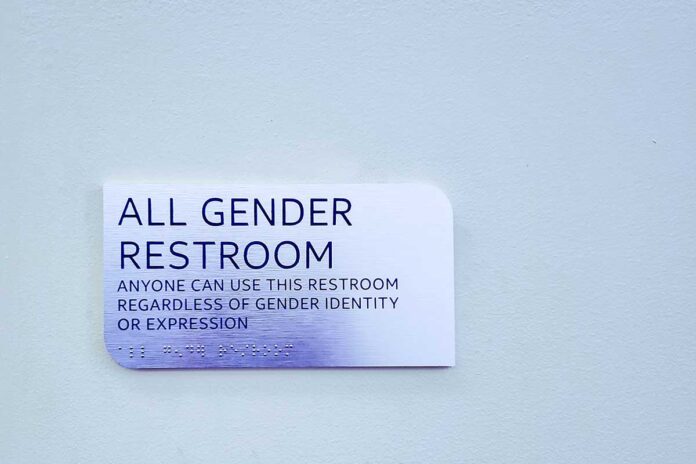Last week, ACLU attorneys challenged a Tennessee law that would require businesses and other public venues to post a warning sign if they allow trans people to use restrooms consistent with their gender identity.
In a related development, the U.S. Supreme Court this week declined to hear an appeal in the long-running case of Gavin Grimm. The trans man sued his Virginia school board in 2015 for access to restrooms consistent with his gender identity. Lower courts ruled in favor of Grimm, and on June 28 the high court declined to hear an appeal. Advocates say the decision helps solidify the rights of trans people to access gender-appropriate restrooms.
The Tennessee law, known as H.B. 1182, goes into effect July 1. It requires the following sign be posted outside trans-friendly, multiperson restrooms: “This facility maintains a policy of allowing the use of restrooms by either biological sex, regardless of the designation on the restroom.” Failure to post the sign could result in a six-month jail term and a $500 fine.
On June 25, ACLU attorneys filed a lawsuit on behalf of Kye Sayers, owner of Sanctuary Performing Arts in Chattanooga, and Bob Bernstein, owner of Fido restaurant in Nashville. Both owners have trans-friendly restroom policies. They seek a preliminary injunction to halt enforcement of the law — which also applies to locker rooms, showers and dressing rooms.
The case has been assigned to U.S. District Judge Aleta A. Trauger of the Middle District of Tennessee. Defendants include the state fire marshal, the state codes enforcement director and two district attorneys. Judge Trauger was nominated by President Bill Clinton in 1998.
Opponents of the new law say it compels anti-trans speech and contributes to anti-trans violence and discrimination. Ultimately, they want the law declared unconstitutional.
The law’s sponsor, state Rep. Tim Rudd (R-Murfreesboro) defended the measure. “Whether you’re a man or woman, don’t you want to know who might be waiting on the other side of a bathroom door when you go in?” Rudd said in a statement. “Everyone has a reasonable expectation to the right of privacy and dignity when using the restroom.”
In a statement, Sayers blasted the new law. “Sanctuary was founded specifically to create a safe space for transgender and intersex people — and their families — in a state that can be unwelcoming to LGBTQ people,” Sayers said. “I am against posting offensive signs that stigmatize and deny the existence of transgender and intersex people at our center. These signs undermine Sanctuary’s very mission and send the exact opposite of the welcoming message we try to convey in everything we do.”
Bernstein echoed Sayers’ concerns. “As a former journalist, I believe strongly in free speech. Politicians have no right to force me to post a controversial, ideologically-motivated and inaccurate sign in my place of business,” Bernstein said, in a statement. “I have worked hard to create a welcoming environment for all in the restaurants that I own. And I don’t intend to stop now.”
The 19-page lawsuit emphasizes the safety needs of trans individuals.
“[Sayers and Bernstein] recognize that requiring transgender people to use restrooms associated with the sex they were assigned at birth would mean that their transgender customer, clients and staff could not use the restroom without significant risk to their safety and dignity,” the lawsuit says.
Sayers and Bernstein don’t wish to change their restroom policies. “In order to avoid being subject to the Act’s compelled speech requirements, [Sayers and Bernstein] would need to change their policies to bar transgender people from using the restrooms that accord with their gender identity. They do not wish to do so,” the lawsuit adds.
Moreover, Sayers and Bernstein don’t wish to “police” their restrooms. “[Sayers and Bernstein] do not have anyone guarding their restroom doors to ask for their birth certificate, inspect anyone’s genitals, or interrogate any other aspect of their sex,” the lawsuit notes. “They do not even know how they would attempt to do so without gross intrusions into the privacy of their employees, customers, and clients. Yet unless they do so, [Sayers and Bernstein] and indeed all other businesses or other entities with restroom facilities open to the public throughout Tennessee will be required to display the specific sign required by the Act.”
According to the lawsuit, trans-friendly restrooms don’t pose a safety risk. “Policies that allow transgender people to use the correct sex-designated restroom — the restroom that best matches their identity — do not legalize harassment, stalking, violence, or sexual assault. Nor do these policies change the sex-segregated nature of these facilities. In other words, allowing transgender people to use restrooms and other facilities that align with their gender identity simply ensures that everyone has access to spaces that match who they are. These policies do not permit unfettered access for anyone, regardless of sex, to spaces restricted to one sex,” the lawsuit contends.
Additionally, the wording of the sign is offensive and could hurt plaintiffs’ business. “[Sayers and Bernstein] understand that the Act’s mandated phrase ‘either biological sex’ in the political context of H.B. 1182 is offensive to transgender and intersex people because it asserts that transgender people are not the sex they know themselves to be and ignores the existence of intersex people,” the lawsuit posits.
As of presstime, a decision on the plaintiffs’ request for a preliminary injunction hadn’t been rendered.
